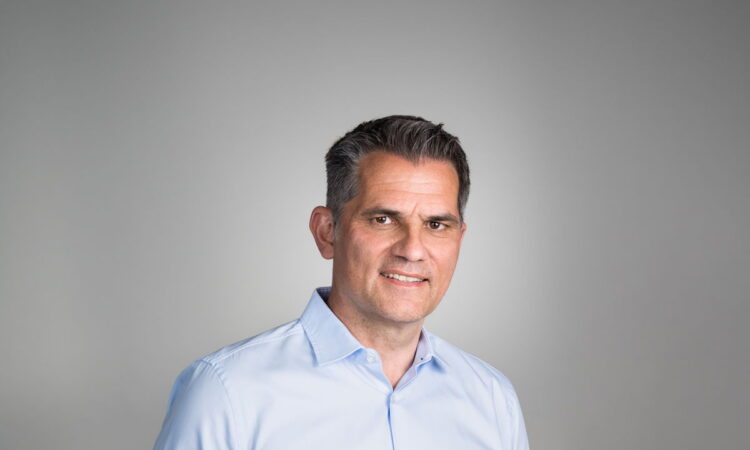
The German CEO of Berlin-based Banking-as-a-Service (BaaS) startup Solaris is an Anglophile.
“I like the English mentality,” says Carsten Höltkemeyer.
“I like their humour. I like the fact that they can laugh about themselves quite a bit. I resonated with a lot of people in the UK.
“The Germans are sometimes very straight. If you don’t like somebody, you say ‘I don’t like you’.”
Höltkemeyer has had plenty of dealings with Brits, by dint of stints at UK finance powerhouses Royal Bank of Scotland and Barclaycard, in a CV wedded to Oscar Wilde’s maxim that the “aim of life is self-development”.
Höltkemeyer says: “When you look back at my CV, there is a lot of change. What I actually like to do is change businesses and change direction, growing, doing better and developing cultures.”
CV
He has hotfooted it around, from a PWC auditor to senior finance roles at Commerzbank (his ambition was always to be a CFO of a traditional bank), to Royal Bank of Scotland and Barclaycard, to senior payment roles, to private equity.
He entered the fintech world not as a young idealist executive but as a 50-year-old plus gnarly banking veteran, wanting to test himself.
His appetite for fintech was whetted by chairing the supervisory board of German digital lender Auxmoney, after which he joined Solaris as CEO in 2021.
He says: “
When you work for a big banking group like Barclays and RBS, you want to do so many things but your technology, people will tell you ‘that will last a few years, few months’.
“So you are limited by your legacy systems quite a bit. Moving into the fintech world, I learned there is a different way of doing things, much quicker, and much faster.”
As a side hustle, the sport-loving CEO has also until recently served as a board member at FC St Pauli (Hamburg’s fußballmannschaft nummer zwei).
However, he left before the team got promoted to the dizzy heights of the Bundesliga this year after a 14-year hiatus.
Channelling English drollness, Höltkemeyer says: “People say ‘immediately after your six-year engagement, they went up to the first league. Is that to do with your departure? I say no, no, I prepared everything and now it’s the easy part’.”
Solaris facts and figs
Solaris, founded in 2015, shines bright among German startups, a unicorn last valued at €1.6bn, which is also one of Europe’s biggest BaaS providers.
The fintech, baked by Visa and Spain’s BBVA, has raised over €470m, including a €96m funding round earlier this year.
It has around 700 staff, across 10 offices including the UK, Spain and Italy and offers its banking services across Europe.
Its latest financials, for 2022, show it notched up around €130m of annual revenues, which are set to almost double after it scooped a 10-year contract to issue credit cards for Europe’s biggest motor association.
But the rise of Solaris has not been trouble-free: it has been shackled by the German regulator BaFin, wary about the BaaS model amid a German financial landscape where the demise of Wirecard still casts a pall.
Furthermore, in light of the demise of the US’s Synapse, which called itself the biggest Banking-as-a-Service company, further questions about the BaaS model have arisen.
The Solaris business
To use industry parlance, Solaris is a BaaS provider, which means it provides white-label financial services, such as debit cards, credit cards, KYC, and digital banking to fintechs, like German fintech Naga Pay and banking platform Vivid Money as well as corporate clients like Samsung and Amex.
Solaris, which has a German banking licence and an EMI (Electronic Money Institution) licence, offers a full suite of banking products including lending options, making it, experts say, more of a compelling offering than many of its competitors.
Solaris can also pass on a per cent of deposit interest to customers.
Competitors across Europe include Aion Bank, a European licenced bank and BaaS provider Vodeno, which together offer embedded financial services across Europe as well as BaaS providers, leveraging EMI licences, like Treezor and Railsr.
BaaS market cooking
The BaaS market continues to cook, as firms look to embed financial services into their product offering to increase customer stickiness.
Europe’s BaaS market size was valued at $116.98bn in 2023 and is expected to grow at 9.4 per cent this year, industry figures show.
At Solaris, clients come in via a mixture of inbound- it gets RFPs (Request for Proposals) from big organisations- as well as outbound from its in-house sales and partnership teams, the CEO says.
ADAC contract
Recently, Solaris’s focus has switched from fintech clients amid fintech funding drying out to higher value corporate clients, exemplified by snatching “landmark” client ADAC.
Expected to bring in north of €100m revenues a year, Höltkemeyer heralds the ADAC contract as “probably one of the biggest you can get in this market”.
Solaris won the account in 2022, providing co-branded credit cards to the motor association’s 22 million members.
But a report in the FT last year said Solaris had struggled to raise €100m in funds, casting doubt over whether it could fulfil the contract.
Funding for upfront payment
The funding, the report said, was needed for an upfront payment to ADAC as well as funding to meet regulatory requirements as it took on ADAC credit cards’ €500mn loan book.
The report said ADAC has contacted bidders of the original contract, DKB, Deutsche Bank and Hanseatic bank, to see whether they would consider clubbing together with Solaris on the contract.
But, says Höltkemeyer, in light of Solaris’s funding round earlier this year, the issue has now been fixed and Solaris is on top of the contract.
He says: “We are in the final phase of migrating the existing supplier of ADAC to our own books. Hopefully, after that, we will see a smooth running of the portfolio.”
Financial discipline
One of the reasons Höltkemeyer was drafted in, given his experiences in the upper echelons of the banking world, was to help Solaris become profitable and instil more banking discipline.
Solaris reported annual losses of €56mn for 2022 but Höltkemeyer says it “scratched profitability” last year, and “probably next year will get much closer to profitability”.
Höltkemeyer admitted that in the past Solaris “didn’t put too much focus on regulation”.
This lack of focus has come back to bite Solaris on the bum.
Earlier this month, the German bank regulator BaFin said it had threatened to fine Solaris if it doesn’t meet deadlines to improve anti-money laundering controls and other shortfalls.
The shortfalls also relate to regulatory reporting and the way it tracks its contracts.
Approval for new clients
BaFin also said that it was extending the mandate of a special monitor installed since 2022 to oversee progress- this means that Solaris can’t bring in new clients without the regulator’s approval.
Solaris is not alone, and others such as German challenger bank N26 have felt the wrath of the German regulator.
Höltkemeyer points out that Solaris has picked up clients, like Bitpanda, via BaFin approval.
He says “we do a risk assessment and then we share it with BaFin and they then support it or not” adding that he is “very confident” Solaris won’t be hit with fines in the future.
He adds:
“I feel since the Wirecard disaster, there has been a lot more scrutiny around how to deal with companies.
“You can say it’s very tough to comply with the regulations. It needs some investments to really comply in full.
“But on the other hand, once you are fully tested and approved by the regulator, I think this is a USP, because what we are selling is a banking product to corporates and, of course, they want to know the partner they are dealing with is fully compliant.”
Another potential deadline facing Solaris, says the CEO, is its investors looking for an exit in the next couple of years.
He says he is “not super concrete” on whether this will be an IPO.
Competitive spirit
Höltkemeyer spends a lot of time on the road, he lives in Hamburg, his family in Düsseldorf and he works in Berlin,on top of which he has work travel.
But an inherently competitive individual, be it in sports or business, he is not one to complain.
He will need to draw on this competitive spirit as he looks to navigate Solaris through the regulatory challenges ahead, instilling financial discipline and scooping some big corporate clients.
Lead image: Carsten Höltkemeyer. Photo: uncredited.






